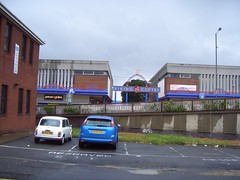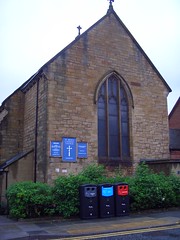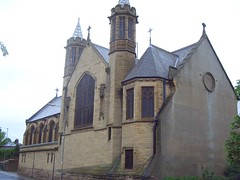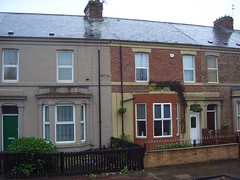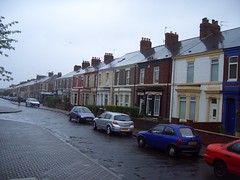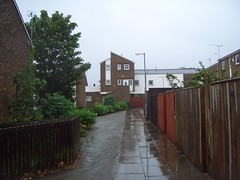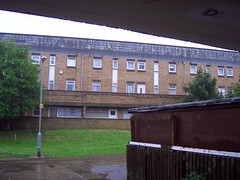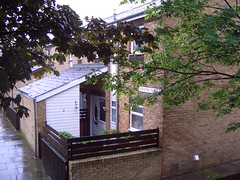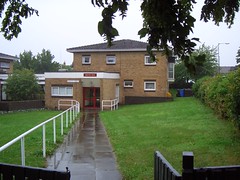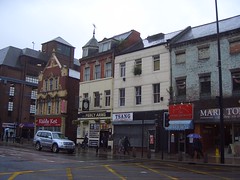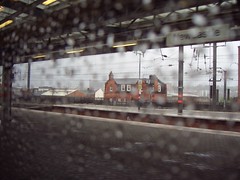The street my Dad was born in
Categories: buildings-and-cities
Tags: urbanwalks, upnorth
Date: 18 June 2007 20:20:24
So to Jarrow in the rain with a metro ticket, my camera, and a mobile phone which I use to phone my Mum, who still has my Dad's birth certificate somewhere and can tell me what house he was born in eighty years ago, give or take a few weeks.
The first thing you see when you get off the Metro at Jarrow is the flyover of a dual carriageway that splits the town, or what's left of it, in three. (*)
The second thing you see in Jarrow - though you can't get to it easily because the road is in the way - is an uncovered shopping mall with intrusive metal security gates and calling itself the Viking Centre. Who on earth thought that up? In a thousand years time will Hamburg have an RAF Centre? Will New York boast an Al Qaida Tower? (**) Some shops boarded up, plenty of charity and discount shops. There's no getting over it, Jarrow is still a poor town, even compared with Sunderland or Shields, never mind the centre of Newcastle. (***)
Anyway, I bought some batteries for my camera and set off round in circles to try to find these little streets, Monkton Road (or Street), Tyne Street, Albert Street (or Road) ad St Bede's church, where my grandparents were married and all their children baptised. The church was easy enough. I suppose if it had been open I'd have gone in. Behind it streets named after Victorian statesmen with some rows of small houses with good back yards and alleys.
Loop back to the station rond the other side of the Viking Centre and over the railway. There's an Albert Street behind the station.
The houses are a couple of grades above the smaller terraces round the Catholic Church, perhaps my great-grandparents weren't quite as poor as some of their descendents made out. (****) Not too many photos, partly because the camera memory was filling up, partly because I was mostly walking though inhabited streets with people in them and it always feels a bit odd to take random photos of other people's houses, partly becuse it was raining so heavily it was hard to take a good picture. Maybe I'll go back some time when its slightly drier and colours show up better. It would be unfair, as well as a cliche, to take nothing but dull photos in the rain. Maybe I could finish them all in monochrome for the real stereotype.
At the end of Albert Road (Which is a street! Not a road!) there is a small and high-density low-rise modern estate, 1970s I'd guess, maybe newer. Quite attractive-looking as these things go. I think I've seen vaguely similar looking housing in a few places in South London (in Lewisham and perhaps Merton) and also up somewhere near Archway.
At the end of that, a bridge over the railway, with a few small new blocks of houses called Monkton Terrace just off it. Maybe that is where my Dad was born. Or maybe this road, which leads back towards St Bede's and is now mostly a houseless roundabout, is Monkton Street (and or Road).
Well, here it is:
Not a lot of that was there in 1927 I guess.
There's a St Bede's School as well, that looks old enough to have been used by my older uncle Joe, and my aunt Vera. No phots there because odd men who stand at school gates at chucking-out-time and take photos of children they aren't related to tend to end up explaining themselves to the police (or to irate parents and neighbours which could be worse) My Dad (Bob) and his younger brother Frank went to school in Brighton (and I think the older ones might have finished school there). The family moved around because my grandfather (who I never met) was in the army, but Dad was born in his grandparents house in Jarrow. When my grandfather died sometime in the 1930s I think, the family relocated in the Brighton area. Almost part of a mass migration, we had aunts and cousins and great-aunts and second-cousins all the way from Portsmouth to Hastings. The women went into domestic service or became nurses, (yes, just like Catherine Cookson) the men got jobs in the military or on the railway or in the post-office.
Which is why I associate a South Tyneside accent with old people. On the train from Pelaw to Jarrow there was a woman behind me who sounded just like some of my old aunts, now dead. I glanced round half expecting to see an old lady and saw a rather attractive blonde woman maybe in her early twenties, scolding a rather snotty-nosed little boy.
And how come the South Tyneside accent is different anyway? (*****) Where did it come from? Its not quite the same as Sunderland, even more like Newcastle, but it is different. I've met people who say they can tell Jarrow from Shields or Hebburn. (but then I've met people who say they can tell which colliery someone used to work in in County Durham by their voice) I don't think I could. But I'm pretty sure I can hear the difference between them and Newcastle or Sunderland (which is not quite the same as telling which is which). Its not a very different kind of voice and there is a huge over lap but there is a difference. More sand and gravel in it somehow. Deeper and flatter.
And how is the accent sustained by such a small community? People are leaving all the time (though not so many coming any more). These places are within walking distance of each other (if you like walking round towns all day). Industrial Lancashire is even more diverse for accent and dialect (though I don't think the Leeds area is (I'm open to correction), and the huge variety of Glasgow and Clydeside accents aren't so geographically sorted as far as I can tell - I bet there is some real research on it somewhere) but they are based on a pre-existing network of market towns that had been industrialising slowly for a couple of centuries by the time the Depression hit and recording technology existed to preserve the voices.
South Tyneside and the industrial coast of Durham grew very fast in the late 19th century. Jarrow was a village without a railway station in 1850, probably larger than it is now by 1890. My own great grandparents were amongst the first generation of industrial workers there. Workers came from all over. Many, perhaps most, from the surrounding countryside of course, or from rural Yorkshire, or the older mining areas of Durham and Tyneside. Many from the south-west of England or from Wales, bringing skills in metal work and mining. Also skilled workers from Scotland, and small numbers from farther, Germany, Scandinavia, eastern Europe, (there is still a prominent Jewish community near South Shields). But the largest visible minority were from Ireland, both Protestants and Catholics, but more of the latter.
So the accent grew up in a generation. The oldest people I met who spoke it were born before the Great War. Their parents might not have spoken it - their grandparents certainly didn't. The working-class South Tyneside culture that sent its men to London to crusade for jobs was only two generations deep. The Jarrow marcher's grandfathers (maybe even some of their fathers) could have been iron miners in Wales, sheep-farmers in Northumberland or tailors in Galway.
Where did the accent come from? Is it the underlying local rural accent straightforwardly adopted by incomers? Did it spread downriver from Gateshead (and if so why is Sunderland so different, five miles away on the next river?) Is it simply a Tyneside accent modified by a large dose of Irish and Welsh? Is that what the Geordie accent itself is, a sort of Northumbrian Scouse? If so, why doesn't it sound remotely Irish to me (maybe my ear just isn't good enough)
And why does it seem (and this is purely anecdotal) that dialect is holding out on Wearside but not Tyneside. Just eavesdropping in the streets and on the trains, most voices I heard in Newcastle sounded clearly Northern, clearly North Eastern, but people were speaking standard English with a northern accent. If you wrote down what they said it would be pretty much the same as a southerner would have said. But over in Sunderland people really do say "aye" rather than "yes" and "gan" rather than "go" Or maybe that's because the Metro floods with office workers at 5pm on a Friday, but the centre of Sunderland doesn't.
As for Corbridge, where I'm staying, I couldn't tell you how they speak. Everything from RP to Canadian it seems. This is a posh place. Though the handful of bored teenagers sitting in the bus shelter on Thursday night sounded like they could have come from anywhere between Whitely bay and Carlisle. Which I suppose they probably did. Durham's just that little bit different again. Its a cliche to say its "softer" and has a "lilt" to it, and I couldn't describe what I mean by those words, but it is and it does. Sort of sexy to be honest. And changing only slowly as you go up into the hills and over the top of England through to the West Coast and down to bump into Lancashire accents just outside Barrow.
So back to Newcastle on my way to the mythical beer festival, and a pint or two in the Percy Arms for old time's sake.
Yes, they still have a rock disco there. Not that I went. Or have been for twenty-five years.
(*)Putting little loops of highway around or through town centres is almost always a social disaster and I expect it was here, though I've no memory of what it looked like before. All those "Inner ring roads" and "Civic Drives" and "Ring Ways" and so on rip gaps through the network of streets, block lines of sight, segregate people on each side of them and generally tear the fabric of the city apart. Roads unit people in the country and the outer suburbs but in the city and town centres and inner suburbs or high-density suburbs streets unite but roads divide. Even where the shops in the centre are prospering (like Preston or Croydon or that vomit-washed exhaust-wreathed suburban wasteland that used to be a town called Romford) inappropriately wide or fast roads cause social problems. Where its not, like Jarrow still isn't, they just rub in the relative powerlessness of the locals compared with the more prosperous drive-pasts.
(**)The whole point of the early history of Jarrow, the only memorable point, the reason that it was well-known at all before they started building ships, was that St Paul's monastery was there, which along with its sister St Peter's down the coast at Sunderland (OK, OK, Monkwearmouth) are the real mother churches of Christianity in England. (Don't believe what they tell you about those Kentish types). And the monks were forced out by the Vikings who were (as the story goes) doing their rape and pillage bit and went to Lindisfarne and then Durham. And thus was the Empire forged. OK, OK, we know that the Vikings were no-where near as bloody as painted, impoverished Nordic economic migrants, and they mostly settled down quite quickly and got on rather well with the English. But they did do a little bit of rape and pillage. And they did some of it right here, well, about five hundred yards down the road by Jarrow Slake and the little hill. Does any crime become an opportunity for commercial branding after enough time? I suppose it does. The Ten Bells in the East End called itself Jack the Ripper for a while but it was too much for most people to take. Maybe there will be a Myra Hindley Tea Shoppe at Ilkley.
(***)Obligatory nod to say yes, I realise that nowhere in Britain, maybe even nowhere in Europe, is now as poor as Jarrow was in the 1930s - there is relative poverty and there is absolute poverty and then they were absolutely poor. Any poorer and they would have died. Its really not like that now.
(****)But then neither was Jarrow or the industrial north-east as a whole in the 1890s or 1900s when these houses were perhaps built, it was the decline in shipbuilding after 1918 (and steel and coal and chemicals) that made it England's most desperate town. Whatever JB Priestley said, these streets aren't and weren't all quite the same and there were gradations in poverty.
(*****) OK, OK, its shorthand. There is no "The South Tyneside Accent" There are very many idiolects which share more or fewer features with each other. And people move, both consciously and unconsciously, through a range of levels and usages. I know all that. Its a crude shorthand.
